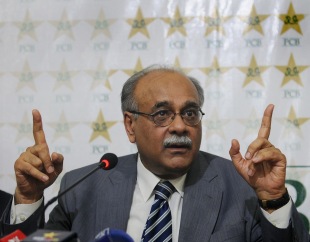Misbah interview raises questions on Sethi’s role – by Umar Farooq
In what can be charitably termed a bizarre occurrence, the PCB head Najam Sethi donned his other hat as a journalist on Saturday night and interviewed Pakistan’s captain Misbah-ul-Haq on his popular political show, Aapas ki Baat.
Sethi asked Misbah all the questions a growing number of critics have been asking as the team has stumbled its way through the limited-overs leg of the South Africa series in the UAE: about the general troubles Pakistan has been having with the batting, about Misbah’s own approach and the influence it has had on younger batsmen, about Misbah’s preferences for specific combinations and his inability to win games. Misbah answered whatever came his way.
But the very fact that a sitting board head was using his own alternative platform as a journalist to allow a captain is bound to raise further questions about the conflict of interest inherent in Sethi’s dual roles. There is nothing amiss about a chairman defending a captain of the side: as one cricket official pointed out, the Pakistan board could have recorded an in-house interview with Misbah and put it up on its website.
“The selection committee and I as PCB chairman continue to back Misbah as captain despite the usual critics,” Sethi told ESPNcricinfo. “He spoke to the media in Lahore earlier and was grilled by them. But his critics raised fresh questions, which is fair enough. So he was given a chance on my live show to answer his critics. This is a more effective way of communicating than putting something on a website.
“I don’t see anything wrong in this. Some perennial naysayers say there is a conflict of interest. I say this was in the public interest. I personally gained nothing from it. But cricket fans have been reassured that there is more to the story than put out by some people. Surely this is good for the motivation and cohesion of the Pakistan Cricket Team.”
But to use the platform of one of Pakistan’s most popular channels, when the chairman happens to be one of its leading anchors, brings back those very questions that were asked when, for example, Geo Super (one of the channels of the network) was awarded broadcast rights to Pakistan’s series against Sri Lanka in the UAE next month. At the time, Sethi dismissed accusations of a conflict by claiming that the bidding process was fair and was carried out by a neutral, independent arbitrator in the form of former ICC President Ehsan Mani.
Sethi’s own position as head of the Interim Management Committee (IMC) – and de facto board head – that is currently running the board is on shaky ground. The PCB is the subject of a convoluted and ongoing legal dispute in the Islamabad High Court (IHC) in which one judge has repeatedly tried to disband the board and bring in a new chairman via an election process. Essentially Sethi’s administration is existing on borrowed time, from one court date to the next: the next hearing is in the first week of December.
Such a stunt is unlikely to have gone unnoticed by critics, or, in this case, petitioners who have filed cases against him. Sethi himself is ambiguous about his dual roles. In Abu Dhabi recently, he was asked at a press conference whether he intended to stay on as the board head once the legal mess was over. His reply, particularly its denouement, was telling.
“I was asked by the Prime Minister (Nawaz Sharif) to come and clean up this mess,” he said of his appointment in June this year. “I had no idea how deep this mess was. I am only now beginning to understand it. But the more one understands it the more one realises a, how important it is to clear up this mess and b, it’s not really cricket, cricket is part of nationalism now. So therefore if the courts allow me and the PM insists that I carry on, I will try and do my best. But at the end of the day I am still a media man.”
Similar conflicts of interest have arisen in the past, though never at the apex administrative level within the PCB. During the tenures of Tauqir Zia and Shaharyar Khan in the early 2000s, for example, Ramiz Raja and Aamer Sohail held senior positions in the board while also working as TV commentators (Sohail, briefly, was chief selector and a commentator). Ultimately Raja resigned because of the conflict while Sohail was removed for other reasons.
Umar Farooq is ESPNcricinfo’s Pakistan correspondent. He tweets here
Source :

